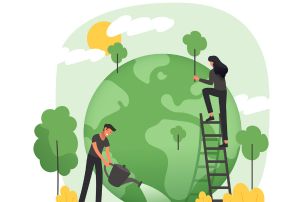This is a comprehensive unit with lessons plans on climate change, energy generation, and sustainability. The plan includes pre and summative assessments, a range of activities, and resources such as books and presentations. The lesson covers topics such as the impact of energy generation on climate change, the transition to renewable energy sources, human responsibilities in combating climate change, sustainable food production, and carbon capture technologies.

IPCC Climate Change Solutions
- Primary
- Secondary
- Year 3 - 10
- English
- Mathematics
- Science
- Humanities and Social Sciences
- Geography
- Business and Economics
- Civics and Citizenship
- Aboriginal and Torres Strait Islander Histories and Cultures
- Environmental
- Climate Change
- Energy
- Recycling
- Sustainability
- Social
- Indigenous Education
- ...
Tune in
- Lesson
- ...
IPCC - Everything you need to know about energy
- Primary
- Secondary
- Year 5 - 8
- Science
- Earth and Space
- Environmental
- Climate Change
- Energy
- Economic
- Design Thinking
- Industry, Innovation and Infrastructure
- Lesson
- ...
IPCC - Can nature and urbanisation co-exist?
- Secondary
- Year 7 - 8
- Humanities and Social Sciences
- Geography
- Aboriginal and Torres Strait Islander Histories and Cultures
- Environmental
- Climate Change
- Disaster resilience
- Lesson
- ...
IPCC - C02 Scrubbers
- Secondary
- Year 7 - 10
- Science
- Earth and Space
- Environmental
- Climate Change
- Energy
- Economic
- Design Thinking
- Industry, Innovation and Infrastructure
- Lesson
- ...
IPCC - Imagining our Climate Future (Science Assessment task)
- Primary
- Secondary
- Year 5 - 8
- Science
- Environmental
- Climate Change
- Energy
- Economic
- Design Thinking
- Industry, Innovation and Infrastructure
Find out
- Lesson
- ...
IPCC - Blue Carbon
- Secondary
- Year 7
- Mathematics
- Numbers
- Ratios
- Environmental
- Climate Change
- Land Management
- Sustainability
- Lesson
- ...
IPCC - Are carbon sequestration technologies the answer?
- Primary
- Secondary
- Year 5 - 10
- English
- Science
- Earth and Space
- Environmental
- Climate Change
- Energy
- Economic
- Design Thinking
- Industry, Innovation and Infrastructure
- Lesson
- ...
IPCC - How do electric cars work?
- Primary
- Secondary
- Year 5 - 8
- Science
- Earth and Space
- Environmental
- Climate Change
- Energy
- Economic
- Design Thinking
- Industry, Innovation and Infrastructure
- Lesson
- ...
IPCC - Does the government legally have to protect young people from climate change?
- Secondary
- Year 7 - 8
- Humanities and Social Sciences
- Civics and Citizenship
- Environmental
- Climate Change
- Disaster resilience
- Lesson
- ...
IPCC - Who doesn't want us to switch to renewables?
- Primary
- Secondary
- Year 3 - 4
- English
- Environmental
- Climate Change
- Energy
Take action
- Lesson
- ...
IPCC - Persuasive advertising about Climate Change
- Secondary
- Year 7
- English
- Learning through literature
- Environmental
- Climate Change
- Energy
- Sustainability
- Lesson
- ...
IPCC - Should we switch to electric cars?
- Primary
- Secondary
- Year 5 - 8
- English
- Environmental
- Climate Change
- Energy
- Economic
- Design Thinking
- Industry, Innovation and Infrastructure
- Lesson
- ...
IPCC - Should We Stop Eating Meat?
- Secondary
- Year 9
- Humanities and Social Sciences
- Geography
- Environmental
- Land Management
- Sustainability
- Economic
- Systems Thinking
- Lesson
- ...
IPCC - Do we need a Universal Declaration of Human Responsibilities?
- Secondary
- Year 7 - 12
- Humanities and Social Sciences
- Civics and Citizenship
- Environmental
- Climate Change
- Recycling
- Sustainability
- Lesson
- ...
IPCC - Degrowth and minimalism to combat climate change
- Secondary
- Year 5 - 8
- Humanities and Social Sciences
- Business and Economics
- Environmental
- Climate Change
- Conservation
- Land Management
- Lesson
- ...
IPCC - Imagining our Climate Future (English Assessment task)
- Primary
- Secondary
- Year 5 - 8
- English
- Environmental
- Climate Change
- Energy
- Economic
- Design Thinking
- Industry, Innovation and Infrastructure
Save
Share this lesson
Copy Link
Copied
Share
Welcome back!
Don't have an account yet?
Log in with:
By signing up to Cool.org you consent and agree to Cool's privacy policy to
store, manage and process your personal information. To read more, please see
our privacy policy here(Opens in new tab).
Create your free Cool.org account.
Many of our resources are free, with an option to upgrade to Cool+ for premium content.
Already have an account?
Sign up with:
By signing up to Cool.org you consent and agree to Cool's privacy policy to
store, manage and process your personal information. To read more, please see
our privacy policy here(Opens in new tab).